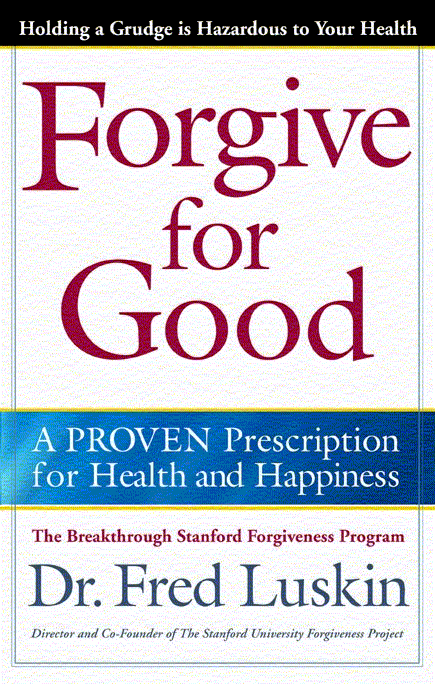Purchase "Forgive for Good" Audio Tapes
Palo Alto man helps cultivate forgiveness
Your boss lied through his capped teeth and promoted his newest flavor of the
month instead of you.
Your sister advised you to dump the loser you were dating. Now she and he are
a blissful couple.
And Fred Luskin thinks you are entitled to it. You get to be hurt, angry and
resentful. If your spouse cheated on you, perhaps six months or a year of fuming
is reasonable. But after an interval of seething, the director and founder of
the Stanford University Forgiveness Project says, you should stop.
Not because it is noble, but because it is practical. Your blood pressure,
your clenched stomach and your co-workers will thank you.
``When you first are hurt, you are processing it through,'' the Palo Alto
psychologist said. ``You need support and advice. You need to tell a couple good
friends. Five years later, the advice you need is to shut up.''
Luskin, a former health-food restaurateur, has made it his calling to help
the furious become unstuck. He runs five-week forgiveness-training seminars at
Stanford that cost $210. He and a Presbyterian minister bring small groups to
California from Northern Ireland for weeklong sessions on healing from the
violence there. And Luskin is explaining his technique in a new book, ``Forgive
for Good.''
Make peace with life
Luskin, 47, says that at each stop on his current book tour, ``I guarantee
you that three people will come up to me and say, `My husband really needs this
book,' '' he said. ``And maybe their husbands really do. When people come
up to me with their personal hurts, I always impersonalize it. I say that hurt
is common. This is a tough planet we got born onto. And there is a way to
perceive that hurt differently. But addressing their specifics cold, I don't
think that's ethical.''
So the Long Island-raised psychologist won't analyze you instantaneously,
like Frasier Crane. But he will tell you that he started on this forgiveness
track after a dear friend dropped out of his life.
An only child of an accountant and a homemaker, Luskin counted on Sam's
friendship. But Sam became engaged to a Californian who disliked Luskin. The day
after she met Luskin, Sam disappeared. No wedding invitation. Nothing.
``I finally wrote him a letter,'' Luskin said in an interview during a stop
in Cleveland. ``I wrote the typical psychologist's letter, this is how I'm
feeling, yada, yada, yada. He sent back a postcard. `Wondered where you were.'
He added at the bottom, `I'd love to see you.'
``I got this intuitive glimpse that I didn't want to be this upset because
he'd been . . . insensitive . . . . The deepest insight that
came to me was we all go to a different movie. He was watching `Love Story' and
I was watching `Abandonment.' Well, I didn't want to give him all that power
over me. I wanted the show to be over. I wanted out of the theater. And I still
wanted the friend.''
Once Luskin set down his grievance, he got back his friend. ``You live long
enough,'' he said, ``people disappoint you. It's the nature of the beast.''
Luskin wondered whether his techniques could help women whose sons had been
killed in the strife in Northern Ireland. He brought a dozen of them to
Stanford, then a group of men and women with murdered family members and, just
recently, community activists from Ireland who are trying to bring peace and
mourn their own dead.
``It is so powerful to get them away to a place that is warm and gorgeous,''
he said. ``We have a group of students wait on them hand and foot. We have homes
for them to stay in. We let them know that 10,000 miles away, people really care
about them. And then we really listen to them.''
Reconciling with hurt
The major religions, from Buddhism to Christianity, make forgiveness a
central tenet. Luskin, who has meditated for 20 years, believes cognitive
psychology provides some of the tools to do it.
A veteran of more than 100 interviews, Luskin said many journalists have
called to ask about forgiveness in the wake of Sept. 11.
``I see it as a train ride,'' Luskin said. ``Forgiveness is the last stop.
First you must work on emotional competence and emotional healing. You must feel
what went wrong. You must name it. You must share it, and you must gain some
control over it. All that has to be there before forgiveness can wipe the slate
clean.
``You don't start with Adolf Hitler. And you don't start with Sept. 11. I
spend my entire first session on gratitude. Then I say choose someone you love
dearly who it would be ridiculous not to forgive for something stupid you've
held on to. A parent, a child, a spouse. Start practicing there. And find out
how good that feels.''
